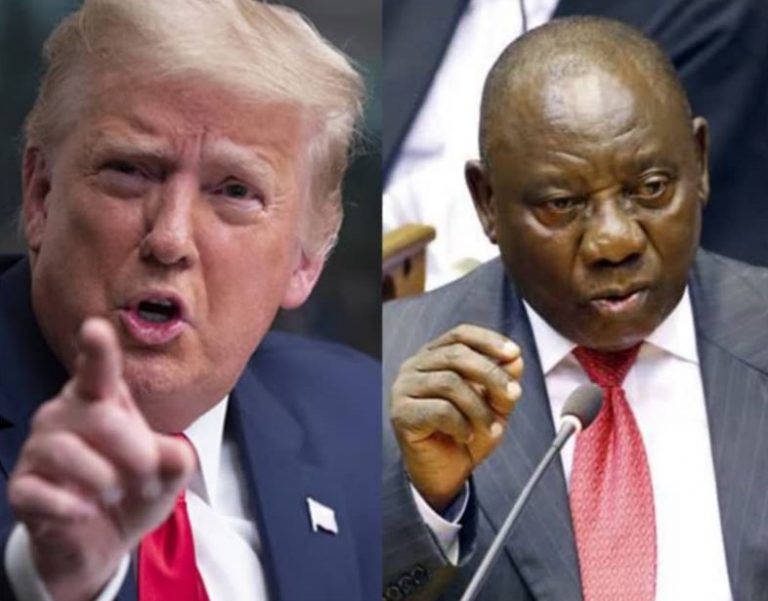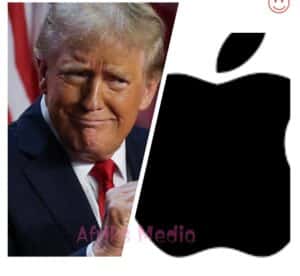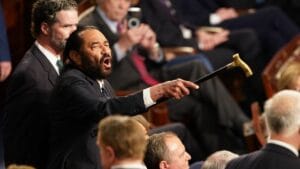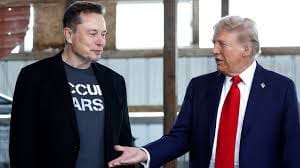South African President Cyril Ramaphosa responded on Monday to U.S. President Donald Trump’s recent remarks about land issues in South Africa. Trump had threatened to stop financial aid to the country, accusing its government of taking land forcefully and mistreating certain groups of people.
On Sunday, Trump announced that future financial assistance to South Africa would be halted while an investigation was conducted.
“South Africa is seizing land and treating some people very unfairly. I will stop all financial aid to South Africa until a full investigation is completed!” Trump posted on his Truth Social platform.
Later, speaking to journalists, Trump criticized South Africa’s leadership, saying they were involved in “terrible” and “horrible” actions but did not provide specific examples.
“We are looking into this issue. A decision will be made, but for now, we need to understand exactly what South Africa is doing. They are taking land, confiscating property, and possibly engaging in even worse actions,” he added.
Ramaphosa’s Response
In response, Ramaphosa took to his X (formerly Twitter) account, where he defended South Africa’s policies. He stated that South Africa is a democratic nation that follows the rule of law, fairness, and justice. He also clarified that his government had not taken any land by force.
Regarding the financial aid issue raised by Trump, Ramaphosa acknowledged that the U.S. is an important political and trade ally. However, he pointed out that the only funding South Africa receives from the U.S. is through the PEPFAR Aid program, which makes up 17% of the country’s HIV/AIDS response.
His statement read:
“South Africa is a constitutional democracy based on justice, equality, and the rule of law. The government has not confiscated any land.
“The recently passed Expropriation Act is not a tool for land seizure but a legal process approved by the constitution. This law ensures that land is made available to the public in a fair and just way.
“Like the United States and many other countries, South Africa has always had expropriation laws that balance the need for public land use with the rights of property owners. We are open to discussions with the Trump administration regarding our land reform policies and other matters of mutual interest. We believe these discussions will help both sides reach a clearer understanding.
“The U.S. remains an important political and trade partner for South Africa. Apart from the PEPFAR Aid program, which contributes 17% to our HIV/AIDS efforts, South Africa does not receive any other funding from the U.S.”
Land Reform and International Reactions
According to AFP, land ownership has long been a controversial topic in South Africa. The government has been working to address historical land inequalities from the apartheid era. However, conservative figures—including Elon Musk, the world’s richest man and a well-known Trump supporter—have strongly criticized South Africa’s land policies.
Last month, Ramaphosa signed a new law stating that under certain conditions, the government can take land without offering compensation if it serves the public interest.
The South African government argues that this law does not give the state unlimited power to seize property. Before taking any land, the government must try to reach an agreement with the owner.
However, some groups fear this policy could lead to situations similar to what happened in Zimbabwe after 1980, when the government took white-owned farms without compensation.
South Africa’s Land Ownership Issue
Land ownership remains one of the most sensitive issues in South Africa. Even though apartheid ended nearly 30 years ago, most farmland is still owned by white South Africans.
Over the years, South African courts have settled a few land disputes. After long legal battles, some land has been returned to Black families who were displaced during apartheid.
According to official records, the 1913 Natives Land Act forced thousands of Black South African families off their land under the apartheid government. This historical injustice has made land reform a highly emotional and politically charged issue.
Right-wing figures, including Elon Musk and journalist Katie Hopkins, have supported white landowners, claiming they are being unfairly treated under the new land laws.
Elon Musk’s Background and Trump’s Allies
Elon Musk was born in Pretoria, South Africa, on June 28, 1971. His father was an engineer, and his mother was a Canadian-born model. Musk left South Africa in his late teens.
Apartheid officially ended in 1990, and South Africa held its first multi-racial elections in 1994.
Trump has surrounded himself with influential tech industry figures who grew up in apartheid-era southern Africa. One example is David Sacks, Trump’s newly appointed adviser on artificial intelligence and cryptocurrency, who co-founded PayPal alongside Musk.
Another key figure in Trump’s circle is billionaire Peter Thiel, a former PayPal co-founder. Thiel introduced Trump to his current vice president, J.D. Vance. Thiel spent part of his childhood in Namibia, which was then controlled by South Africa.
Thiel has previously been accused of supporting apartheid, the system that oppressed Black South Africans while maintaining white control over politics and the economy. However, his spokesperson has denied these claims.
The debate over South Africa’s land policies continues to spark global discussions. While Ramaphosa insists that land reforms are carried out lawfully, critics remain skeptical. Trump’s decision to cut aid to South Africa may further strain relations between the two nations.
The coming months will likely bring more discussions and possible diplomatic negotiations to address misunderstandings between the U.S. and South Africa on this sensitive issue.





